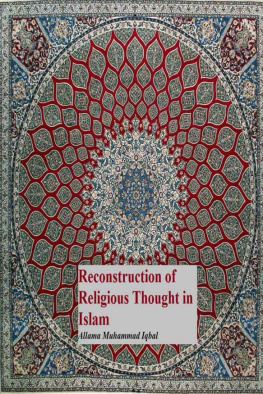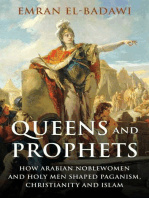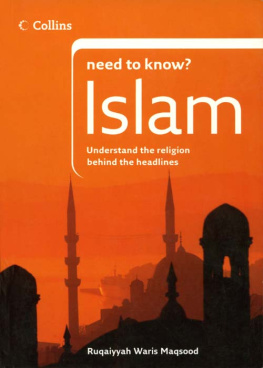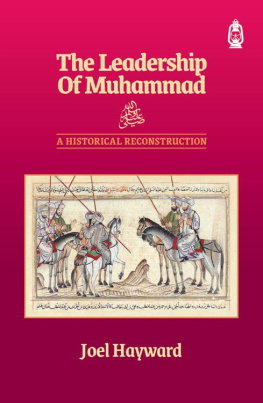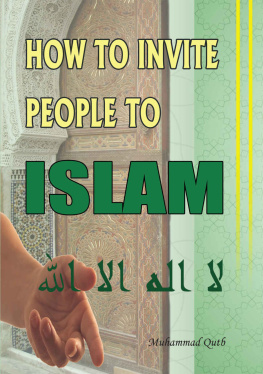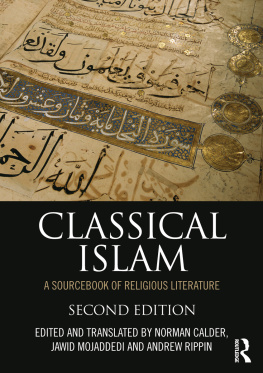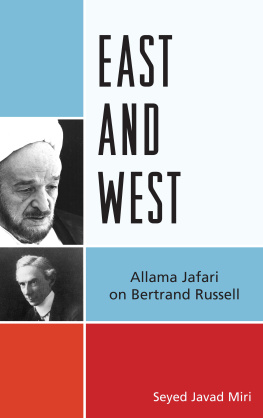Allama Muhammad Iqbal - Reconstruction of Religious Thought in Islam
Here you can read online Allama Muhammad Iqbal - Reconstruction of Religious Thought in Islam full text of the book (entire story) in english for free. Download pdf and epub, get meaning, cover and reviews about this ebook. year: 2018, publisher: UNKNOWN, genre: Religion. Description of the work, (preface) as well as reviews are available. Best literature library LitArk.com created for fans of good reading and offers a wide selection of genres:
Romance novel
Science fiction
Adventure
Detective
Science
History
Home and family
Prose
Art
Politics
Computer
Non-fiction
Religion
Business
Children
Humor
Choose a favorite category and find really read worthwhile books. Enjoy immersion in the world of imagination, feel the emotions of the characters or learn something new for yourself, make an fascinating discovery.
- Book:Reconstruction of Religious Thought in Islam
- Author:
- Publisher:UNKNOWN
- Genre:
- Year:2018
- Rating:4 / 5
- Favourites:Add to favourites
- Your mark:
- 80
- 1
- 2
- 3
- 4
- 5
Reconstruction of Religious Thought in Islam: summary, description and annotation
We offer to read an annotation, description, summary or preface (depends on what the author of the book "Reconstruction of Religious Thought in Islam" wrote himself). If you haven't found the necessary information about the book — write in the comments, we will try to find it.
Reconstruction of Religious Thought in Islam — read online for free the complete book (whole text) full work
Below is the text of the book, divided by pages. System saving the place of the last page read, allows you to conveniently read the book "Reconstruction of Religious Thought in Islam" online for free, without having to search again every time where you left off. Put a bookmark, and you can go to the page where you finished reading at any time.
Font size:
Interval:
Bookmark:
Editors Introduction
In the present edition of Allama Iqbals The Reconstruction of Religious Thought in Islam, an attempt has been made at providing references to many authors cited in it and, more particularly, to the passages quoted from their works. The titles of these works have not always been given by the Allama and, in a few cases, even the names of the authors have to be worked out from some such general descriptions about them as the great mystic poet of Islam, a modern historian of civilization, and the like.
The work, however, referred to more often than any other, and quoted most, is the Qurn. Of a large number of passages quoted from it, about seventy-seven, generally set apart from the main text, carry numbered references to the Quranic Su`rahs and verses. The unnumbered passages from the Qurn, about fifty or so, given within the text are comparatively briefer - sometimes very brief, merely calling attention to a unique expression of the Qurn. References to these as well as to many Quranic ideas and quite a few Quranic subjects, alluded to especially in the first five Lectures, have been supplied in the Notes and later also in the Index of Quranic References. A numerical scanning of this Index shows quite significantly that the number of verses bearing on the subjects of man, Quranic empiricism and the phenomenon of change (mostly in terms of alternation of the night and the day and also in a wider sense) in each case, is comparatively larger than the number of verses on any other single subject. This may as well be noted in the clustering of such verses or of references to them on quite a few pages of the Reconstruction.
Added to the verses quoted from the Qurn and references to them, in the present work, are a good number of quite significant observations and statements embodying Allamas rare insight into the Qurn born of his peculiarly perceptive and deep study of it. These are to be found scattered all over the work, except in Lecture VII, where one would notice just one observation and complete absence of passages from the Qurn, possibly because it was originally addressed to a non-Muslim audience. About sixty-five of these observations and statements have been listed in the general Index under: observations and statements based on as a sub-entry of the Qurn.
Of the other works quoted from in the Reconstruction, forty-nine that I could work out and later list in the Index, about fifteen are by Muslim authors, mostly mystics and mystic poets. Passages from these Muslim works, originally in Arabic, Persian or Turkish, have been given, with the single exception of Rms Mathnawi, in their first-ever English translation by Allama Iqbal. Notable among these are passages from Fakhr al-Dn al-Rzs Al-Mabhith al-Mashriqyah and Shaikh Ahmad Sirhindi`'s Maktbt and, above all, Ziya Gokalps Turkish poems, which the Allama was able to render into English from their German version by August Fischer in his Aus der religi sen Reformbewegung in der T rkei (Leipzig, 1922).
Equally important and perhaps more are Allamas condensed English versions of considerably longer passages or sections from Ibn Maskawaihs al-Fauz al-Asghar (on evolutionary hypothesis in both the biological and the spiritual sense), Shh Walullah magnum opus alHujjat Allh al-Blighah (on the prophetic method of building up a universal Sharah) and Irqs Ghyat al-Imkn f`Diryat al-Makn (on the plurality of space-orders and timeorders). This last, the longest of all the summarized translations from works in Arabic or Persian, was originally prepared by Allama Iqbal from the, then a rare, Manuscript for his Sectional Presidential Address: A Plea for Deeper Study of the Muslim Scientists presented at the Fifth Oriental Conference, Lahore: 20-22 November 1928. The translation of the passage from Shh Wal Allhs Al-Hujjat Allh al-Blighah however, seems to belong to a still later date. There is a clear reference to this significant passage in Allama Iqbals letter addressed to Sayyid Sulaimn Nadvon 22 September 1929, i.e. a month before he delivered the first six Lectures at the Aligarh Muslim University. All these summarized translations, it may be added, from parts of the main text of Lectures III, V and VI.
As to Rms Mathnaw, quoted very extensively (six of its verses are quoted even in the original Persian), one is to note that the translations of all the passages from it are not by Allama Iqbal himself but by others: Whinfield, Nicholson (with certain modifications) and Thadani, only in one case has the Allama given his own translation of a verse from Rm (p. 88); but, unbelievable though it is, this verse, according to the Persian translator of the Reconstruction, is to be found neither in the Mathnawnor in the Kulliyt-i Shams. This certainly needs further research. However, almost every time a passage is quoted from the Mathnawor even a reference is made to it, the reader is reminded of the beautiful words of Rm and of his being far more true to the spirit of Islam than, says, Ghazz`l.
Of about thirty-four Western writers from whose works the Allama has quoted, as many as twenty-five were his contemporaries and among these one is to underline the names of Whitehead, Eddington, Wildon Carr, Louis Rougier, and certainly also of Spengler. One is also to note that the works of these and other contemporaries quoted from happen to be mostly those which were published between 1920 and 1928. This is not at all to minimize the importance of quite significant passages quoted from the works of Bergson, James, Hocking and even Aghnides, all published before 1920, but only to refer to the fact of there being a greater number of quotations in the Reconstruction from Western works published within a certain period of time.
The year 1920, in fact, happens to be the year of the publication of Einsteins epoch-making Relativity: The Special and the General Theory: A Popular Exposition. And it is the year also of the publication of Eddingtons Space, Time and Gravitation and Wildon Carrs General Principle of Relativity in Its Philosophical and Historical Aspect, perhaps the earliest expository works on Relativity by English writers. Passages from both these works are to be found in the Reconstruction. Einsteins own work is catalogued in Allamas personal library along with a dozen others bearing on Relativity-Physics.
Mention must also be made here of Alexanders peculiarly difficult two-volume Space, Time and Deity, which on its appearance in 1920 was hailed as a philosophical event of the first rank. This is perhaps the first contemporary work which received Allamas immediate professional comments, even though brief, embodying his significant admission: Alexanders thought is much bolder than mine. Despite Alexanders pronounced realistic (and thereby also naturalistic-empiric tic and so scientific) metaphysics, the Allama seems to have found in his supreme principle of emergence a kind of empirical confirmation of Bergsons creative evolution. It was verily in terms of the principle of emergence that he explained to Nicholson his idea of Perfect Man in contradistinction to that of Nietzsches Superman in his long, perhaps the longest, letter addressed to him on 24 January 1921.
Allama Iqbals assessment of the works of Western writers, especially of those which received his closest attention, seems to be characterized by the ambivalence of admiration and dissatisfaction, or acceptance and rejection. This is also reflected in one of his most valuable dicta addressed to Muslims: Approach modern knowledge with a respectful but independent attitude (p. 78). Nowhere is this ambivalence perhaps better exemplified than in Allamas treatment of Spenglers
Font size:
Interval:
Bookmark:
Similar books «Reconstruction of Religious Thought in Islam»
Look at similar books to Reconstruction of Religious Thought in Islam. We have selected literature similar in name and meaning in the hope of providing readers with more options to find new, interesting, not yet read works.
Discussion, reviews of the book Reconstruction of Religious Thought in Islam and just readers' own opinions. Leave your comments, write what you think about the work, its meaning or the main characters. Specify what exactly you liked and what you didn't like, and why you think so.

